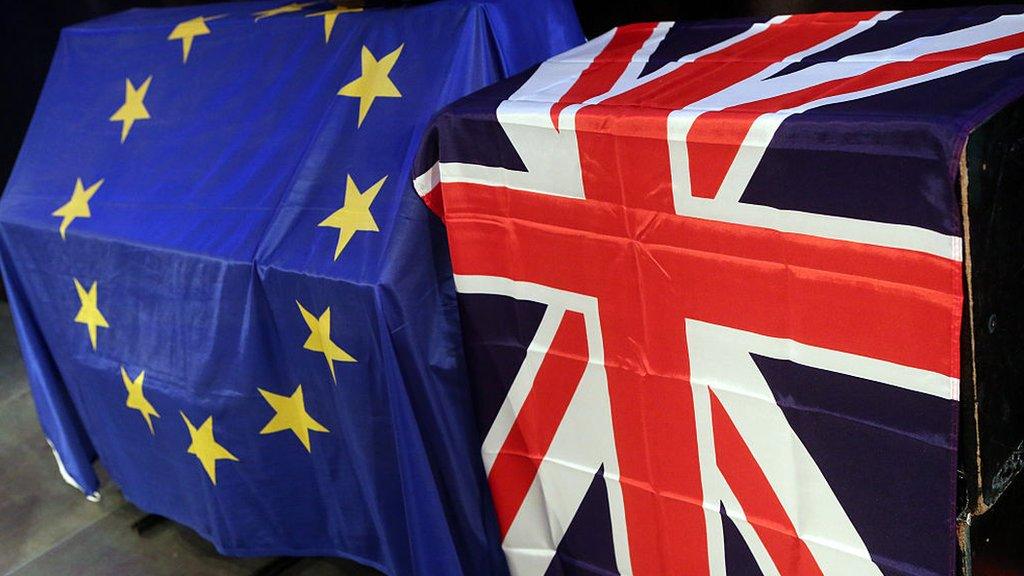Week ahead
- Published
- comments
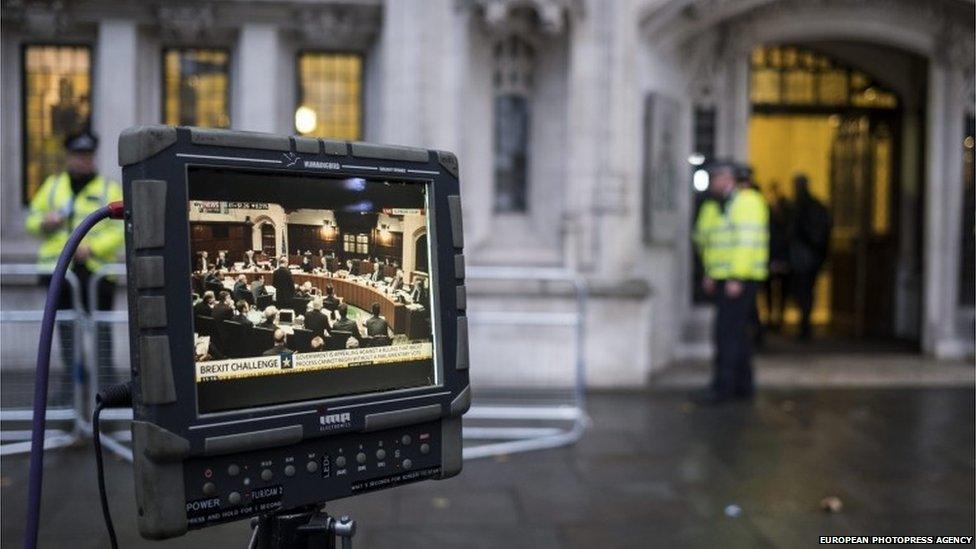
The Supreme Court judgement on Article 50 is imminent...
With rising chatter anticipating the publication of the Supreme Court ruling, external on whether Parliament has to vote on the triggering of Brexit, via the now-famous Article 50, next week's biggest parliamentary event will probably be the ensuing ministerial statement giving the government response.
And parliamentary follow-up can also be expected after it was confirmed that Theresa May will make her long-awaited major speech on Brexit on Tuesday, which might offer some glimpses of the government's negotiating aims.
Elsewhere, after a government defeat and a tied vote this week, it looks like a quiet week in the Lords (unless Article 50 fallout intrudes).
Peers look unlikely to push back at the government after MPs rejected changes they had made to the Policing and Crime Bill. There are plenty of amendments down for the committee stage of the Higher Education and Research Bill - but despite the continuing chuntering around this measure, there seems little enthusiasm to push any of them to a vote.
Watch out to see if Labour moves fast to move the writ for a snap by election in Tristram Hunt's Stoke on Trent Central (Jamie Reed in Copeland has yet to actually resign, and may not quit till the end of the month... although campaigning is already under way in his seat, and MPs from various parties have already been up to show the flag).
Here's my rundown:
Monday
The Commons meets at 2.30pm for Communities and Local Government questions (which may include some attempts to anticipate the forthcoming Housing White Paper - there might be a ministerial statement on this at some point, but it is also possible the government will wait until the sound and fury around the Article 50 judgement has died down....)
The end of question time at 3.30pm is the usual slot for any urgent questions or ministerial statements - the main debate due to follow is the second reading of a fairly uncontroversial bill to improve the governance arrangements and transparency of the National Citizen Service Bill, external - which provides volunteering opportunities for young people.
Select committee of the day is the Transport Committee hearing on Rail Safety (4.05pm) with witnesses from the British Transport Police. This is the focus of the industrial dispute at Southern Rail.
In the Lords (2.30pm) watch out for Crossbench Baroness Meacher's question on legalisation of assisted dying for terminally ill patients - the government has no plans to legislate on this, after the strong Commons rejection of Rob Marris's Assisted Dying Bill.
But the issue has resurfaced because of the case of Noel Conway, a terminally ill motor neurone sufferer who is going to the High Court to challenge the blanket ban on assisted suicide for terminally ill, mentally capacious people. He fears being entombed in his body and choking to death. Baroness Meacher says 82% of the population believe such patients have the right to control at the end of life and to end intolerable suffering.
There's also the now standard Brexit question; the Crossbench peer Lord Dykes (ex Lib Dem peer, ex pro EU Tory MP) will ask about the request by TUC General Secretary that the UK secures full membership of the EU Single Market.
When they turn to law-making, peers are expected to perform their last rites on the Pension Schemes Bill, external third reading pretty rapidly - there's just one, uncontroversial government amendment to deal with.
And then the Higher Education and Research Bill, external moves into its third day of committee consideration. The focus will be on clauses dealing with the new Office for Students, getting students on to the electoral register, mental health, accelerated degrees, fees, and credits. As noted above, I doubt the battery of amendments put down by peers across the party spectrum will actually be pushed to a vote, but there is certainly a feeling that their concerns are not being taken on board...
The latest to weigh in is the Constitution Committee which is concerned that the bill transfers powers, including the power to bestow university status upon an institution, from the Privy Council to the new Office for Students. Along with the influential Delegated Powers and Regulatory Reform Committee, external they are concerned about a lack of parliamentary scrutiny for the use of these powers.
There will also be a short debate on the impact on litigants in person of the introduction of administration charges and other costs when bringing claims in courts and tribunals, led by Baroness Gardner of Parkes
Meanwhile, across the corridor in the Moses Room there will be Grand Committee debate on a European Select Committee report on the implications of Brexit fisheries - a series of debates on these EU reports is expected over coming weeks.
Tuesday
The Commons opens (11.30am) with Treasury questions, followed by a Ten Minute Rule Bill on burial rights reform, from the Conservative David Burrowes. He's following up on a constituency case where there was a family dispute over who had rights over a relative's grave - he wants the law to prioritise the wishes of the deceased.
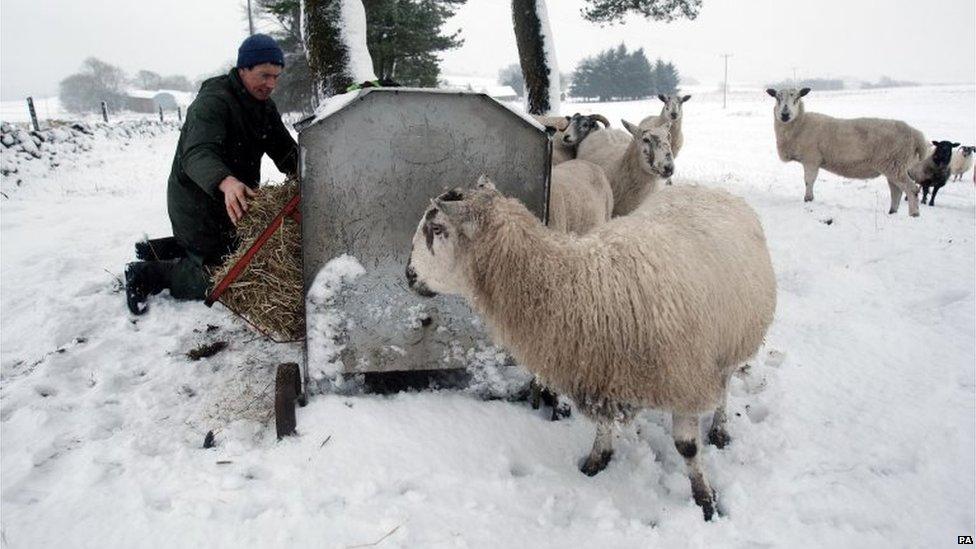
Scotland's farmers, crofters and growers produce output worth around £2.3bn a year, according to the NFU Scotland
The day's main debates are on two SNP Opposition Day motions; first, the impact of leaving the EU on the rural economy, where there are concerns about the repatriation of powers to the Scottish Government after Brexit, replacing EU support for hill farming and about seasonal labour at harvest time; second, on the impact of DWP policies on low income households, which will range across the phasing-in of Universal Credit and the closure of job centres in Glasgow.
In Westminster Hall, the afternoon debate (2.30pm-4pm) on the effect of the UK leaving the EU on infrastructure in Wales, is led by Labour MP Stephen Doughty. And at 4pm, former Justice Minister Dominic Raab raises the interesting issue of police support for investigations when UK nationals are murdered abroad - this picks up on the case of a constituent who was murdered in the Caribbean island of St Lucia. In particular, he wants clarifications about the support available to families where someone is murdered in a state with weak or dysfunctional policing.
My select committee pick is the Defence hearing (11.30am) on the Annual Report on the Armed Forces Covenant, with minister Mark Lancaster. The committee has taken an increasing interest in welfare issues like the use of Larium, the activities of the Iraq Historic Allegations Team (IHAT) and deaths during training, since the last election...so some of these subjects could well come up.
In the Lords (2.30 pm) question time includes a Lords classic from the Conservative Viscount Ridley, who will ask ministers about the bicentenary of David Ricardo's principle of comparative advantage and the case for free trade - do I detect a Brexit subtext?
The peers get their first debate on the Neighbourhood Planning Bill, external - the key issues will include neighbourhood planning, pre-commencement planning, compulsory purchase orders, the planning register; and housing.
A Housing White Paper is expected to be published in the near future and some of its proposals might be added on to this bill.
Wednesday
In the Commons (11.30am) MPs open with half an hour of Scottish Questions, followed, at noon by Prime Minister's questions. The day's Ten Minute Rule Bill, from Labour's Joan Ryan, is on establishing an international fund to support Israeli-Palestinian co-existence projects.
That is followed by the latest in the series of general debates on the ramifications of exiting the EU - this one will focus on security, law enforcement and criminal justice. Expect much probing about which European law enforcement institutions the government will wish to keep Britain in - with additional interest because this is very much the PM's old stamping ground.
In Westminster Hall (2.30pm-4pm), the Lib Dem Mark Williams leads a debate on the future of the Welsh language broadcaster S4C.
And from 4.30pm-5.30pm, the pro-Brexit Conservative, Gordon Henderson, has a debate on the process for the UK to leave the EU.
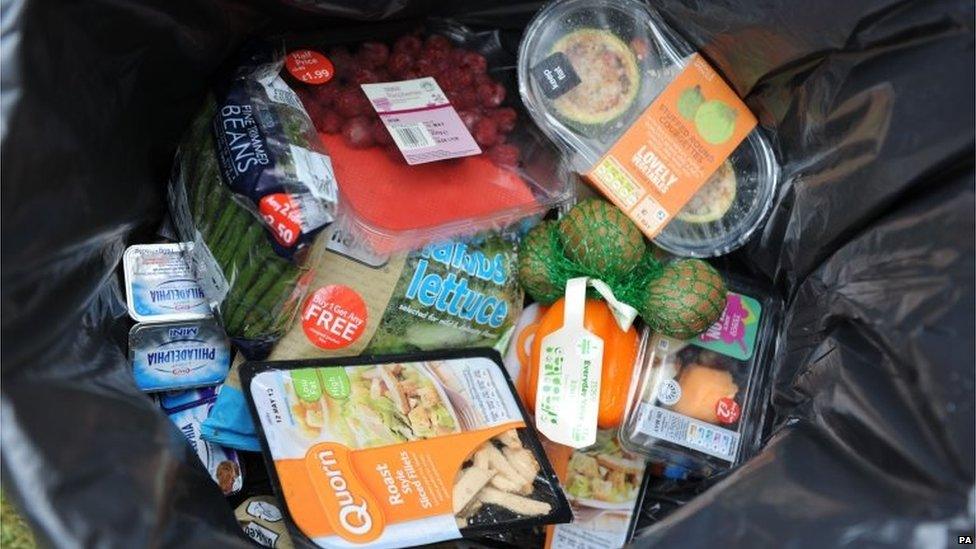
The organisation Wrap estimates the amount of household food waste in the UK for 2015 was 7.3 million tonnes
My committee pick is the Environment Food and Rural Affairs hearing on Food Waste with witnesses from Tesco, Sainsbury's, Waitrose and Morrisons. And with a new committee looking at ways to reduce the size of the House of Lords, the Lords Constitution Committee hearing (10.30am) on legislative process, with Professor Lord Kakkar, Chairman of the House of Lords Appointments Commission, might be one for the aficionados to watch.
In the Lords (3pm) the main event is ping-pong with the Commons over their amendments to the Policing and Crime Bill, external, where MPs have removed Lords amendments on an inquiry into police collusion with the press and on financial support for victims families in inquests. Will peers back down, or fire alternative amendments back to MPs?
Next comes the third reading of the Wales Bill, external - where there are a few last-minute tidying-up amendments, which should be dealt with very rapidly, and then peers move on to day four of the Higher Education and Research Bill, external committee stage (see above).
For real hard-core aficionados, the day ends with a debate led by the former Head of the Civil Service Lord Butler of Brockwell on including statistics on the time spent on parliamentary proceedings on each part of an act in the explanatory notes on Acts of Parliament.
The argument, put by former Parliamentary Counsel Daniel Greenberg (Parliamentary Counsel are the specialist lawyers who draft legislation) is that line-by-line scrutiny of legislation in both Houses had "become diluted to such a degree that it can no longer be described as taking place", and as a result there were "often lengthy and significant parts of a bill that receive no detailed scrutiny at all at any point in its parliamentary passage".
So he proposed that publishing detailed breakdowns of the number of hours spent debating devoted to on each section of a bill, and in particular listing clauses where no substantive discussion took place. The idea seems to be to shame governments into allowing more systematic scrutiny. I daresay more general gripes about the law-making process will surface - the speakers' list for the debate includes the former Clerk of the Commons, Lord Lisvane, and the former Conservative Chief Whip, Lord Ryder. Anoraks will be worn.
Thursday
In the Commons (from 9.30am) half an hour of Environment, Food and Rural Affairs questions is followed by mini-question times to the MPs who speak for the Church Commissioners, the House of Commons Commission (its administrative arm), the Public Accounts Commission and the Speaker's Committee on the Electoral Commission.
Then comes the weekly Business Statement from the Leader of the House - after its failure to appear in last week's list of forthcoming debates, MPs will be keen to see whether their vote on the plan for a multi-billion pound revamp of their Victorian home has been scheduled. There's increasing concern that disaster may engulf the building if nothing is done, but at the same time the criticism of the plan to spend a fraction of the amount proposed for Westminster on restoring Buckingham Palace has alarmed many. "At least the Queen is popular," one senior MP remarked.
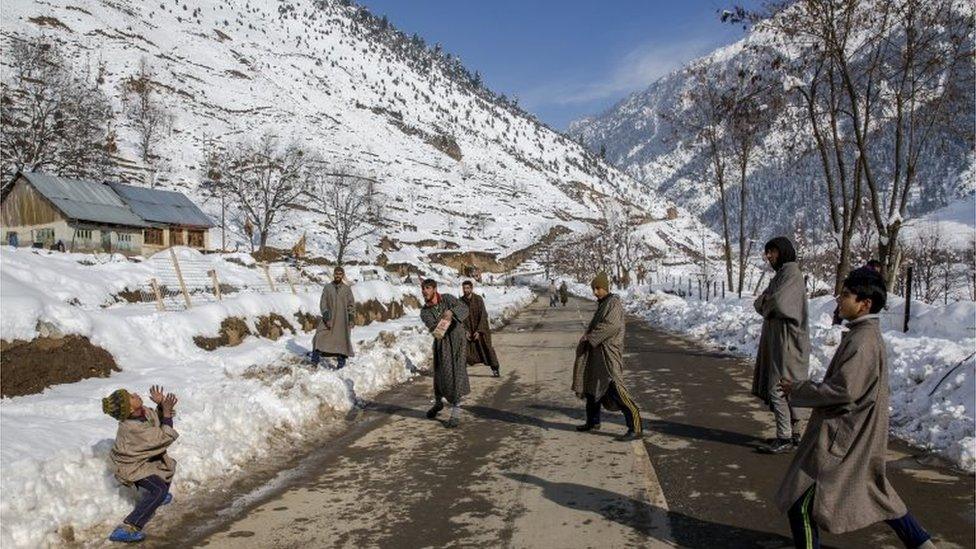
A debate on Kashmir will focus on escalating violence in the region
The main debates are on two subjects chosen by the Backbench Business Committee - on Kashmir, on a motion noting escalating violence on the Indian side of the line of control, and calling for the UK government to raise the issue at the UN. Second is a motion to mark Holocaust Memorial Day 2017.
In Westminster Hall (1.30pm) there's a debate on the decommissioning of in vitro fertilisation and other NHS fertility services, led by the cross party trio of Steve McCabe (Labour), Ed Vaizey (Conservative) and Tom Brake (Lib Dem). They complain that NHS guidance on the availability of in vitro treatment is disregarded by most, possibly all, Clinical Commissioning Groups, leaving hundreds of parents trying to have children in great distress.
In the Lords (from 11am) question time includes Lord Green of Deddington asking about of the number of new homes required for migrants in England in each year up to 2039, and Baroness Grender following up her private member's bill on letting agents with a question on steps to implement the ban on lettings fees announced in the 2016 Autumn Statement - she will be probing just how comprehensive the ban will be, and whether loopholes will remain for lettings agents to exploit.
The main debates will be on subjects chosen by backbench Lib Dem peers - and as is now usual, the first will be on a Brexit-related topic, with Lord Clement-Jones raising the impact of UK withdrawal from the EU on the creative industries. Then Lord Bruce of Bennachie (the former MP Malcolm Bruce) has a debate on challenges to the liberal international order by the development of populism and nationalism around the world.
Friday
In to Commons (9.30am) it's another day devoted to private members' bills. Top of the agenda is the second reading of the Conservative John Glen's Merchant Shipping (Homosexual Conduct) Bill - a straightforward one-line measure to repeal laws allowing merchant seamen to be sacked on the basis of homosexual conduct. Last year the equivalent clauses applied to military personnel were repealed in the Armed Forces Act. This is an uncontroversial hand-out bill, with full government support, so it will almost certainly become law.
Next is the Highway Works (Weekend Working and Traffic Management Measures) Bill from the Conservative, Wendy Morton, which deals with weekend and bank holiday working and provision about removal of traffic lights and other traffic management measures after the completion of works.
Further down the agenda, where it might just get a few minutes of debate, lurks Caroline Lucas's Personal, Social, Health and Economic Education (Statutory Requirement) Bill and behind that, her Railways Bill, which requires the transport secretary to take control of passenger rail franchises when they come up for renewal.
And then there's Frank Field's Housing Standards (Preparation and Storage of Food by Tenants in Receipt of Universal Credit or Housing Benefit) Bill, which aims to ensure that rented accommodation meets minimum standards for the hygienic storage and preparation of food; contains adequate appliances, equipment and utensils. Interesting subjects all - but unlikely to be discussed.
The adjournment debate led by Maria Caulfield, is on what is fast becoming one of the hardy perennial subjects for this parliamentary niche, Southern Rail.
- Published30 December 2020

- Published28 March 2017
